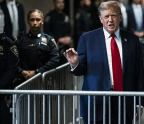Timeline of Russia Investigation

Since July 2016, the FBI has been investigating the Russian government’s attempt to influence the 2016 presidential election, including whether President Donald Trump’s campaign associates were involved in those efforts.
“Russian President Vladimir Putin ordered an influence campaign in 2016 aimed at the US presidential election” between Trump and Democratic presidential nominee Hillary Clinton, according to the U.S. intelligence community. Russian intelligence services gained access to the computer network of Democratic Party officials and released the hacked material to WikiLeaks and others “to help President-elect Trump’s election chances,” the IC said in a report released earlier this year.
At this point, no evidence of collusion between the Russians and the Trump campaign has been made public. It may or may not exist. However, there is an ongoing investigation.
Here we present a timeline of key events in the investigation. We will update this timeline as necessary. For those reading this on a website other than FactCheck.org, please click here for updates.
2015
July — The Main Intelligence Directorate, or GRU, which is responsible for intelligence collection for the Russian military, gains access to the Democratic National Committee computer network and maintains that access until at least June 2016, when the hacking plot was publicly disclosed. (This is according to a report issued Jan. 6, 2017, by the Office of the Director of National Intelligence.)
December — Some social media accounts apparently tied to a Russian online propaganda operation start to advocate for Trump’s election. (This is also according to the DNI report issued Jan. 6, 2017. That report attributed its source to “a journalist who is a leading expert on the Internet Research Agency,” a Russian online propaganda operation.)

Retired Lt. Gen. Michael Flynn
Dec. 10 — Retired Lt. Gen. Michael Flynn speaks at RT’s anniversary conference in Moscow. RT is a Russian government-funded TV station once known as Russia Today. Flynn, who would become a foreign policy adviser to Trump during the campaign and national security adviser in the Trump administration, sits next to Putin at the event. In remarks at the event, Flynn is critical of the Obama administration’s foreign policy and supportive of working with Russia to battle ISIS. (It’s later learned that he was paid $45,000 for his appearance, and failed to report the income on his government financial disclosure forms.)
2016
Feb. 26 — Reuters reports that Flynn “has been informally advising Trump” on foreign policy during the presidential campaign.
March — Russian intelligence services probably begin the cyber operations that resulted in the compromise of the personal email accounts of Democratic Party officials and political figures. (This is according to the Jan. 6, 2017, report issued by the Office of the Director of National Intelligence.)
March 21 –– Trump tells the Washington Post that Carter Page, an American businessman who has worked in Russia and now owns a consulting firm called Global Energy Capital, is a member of his foreign policy team. (The Post would later report that the FBI was monitoring Page’s communications as part of its Russia probe.)
March 29 — Trump announces that Paul Manafort, a longtime Republican operative, will be his campaign convention manager. Manafort had worked for more than a decade for pro-Russia political organizations and people in Ukraine — including Viktor Yanukovych, the former president of Ukraine and a close ally of Putin.
April 27 – Trump delivers a foreign policy speech at the Mayflower Hotel in Washington, D.C. Sergey Kislyak, Russian ambassador to the United States, attends the speech. Trump vows to improve relations with Russia by finding shared interests, such as combating terrorism. “I believe an easing of tensions and improved relations with Russia — from a position of strength only — is possible, absolutely possible,” Trump says.
June 14 — The Washington Post reports that hackers had gained access to DNC servers. It is the first public disclosure of the security breach.
June 15 — CrowdStrike, a computer security firm hired by the DNC to investigate the hacking, says that Russia is behind the cyberattack. In a blog post on its website, CrowdStrike co-founder Dmitri Alperovitch says that the company “immediately identified two sophisticated adversaries on the network – COZY BEAR and FANCY BEAR.” He wrote that “both adversaries engage in extensive political and economic espionage for the benefit of the government of the Russian Federation and are believed to be closely linked to the Russian government’s powerful and highly capable intelligence services.”
Guccifer 2.0 for hacking the DNC computers and releases a few documents, including the Democratic Party’s 200-page opposition research report on Donald Trump. “The main part Guccifer 2.0 as the “persona” used by Russian military intelligence to release hacked emails to media outlets and WikiLeaks.)
You’re reading a preview, subscribe to read more.
Start your free 30 days





